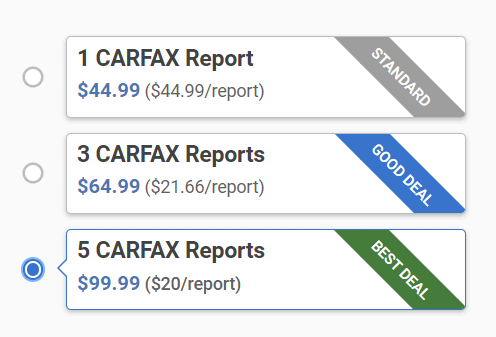So, you might have bought a new car for your house garage. Although the car looks fantastic, it has travelled over 20k kilometers. But if you do not know how to read a Carfax report for used cars, this article is for you.
Most of the time, used cars have accident histories that are often not disclosed by their previous owners. Therefore, you must check its CarFax report to learn every nitty-gritty detail about the vehicle you are buying. According to a report, an estimated 454,000 previously flooded vehicles are currently on U.S. roads, with many slipping into the used‑car market via “title washing.
In this guide, we will provide a guide on how to read a Carfax report for used cars. Without further ado, let’s dive into it.
What is a Carfax Report?
A Carfax report is a vehicle history report that provides you with detailed information about a used car, truck, or motorcycle. This report includes information about the car’s accident history, previous owners, damages, and service record. Understanding Carfax is essential for every individual who is looking to buy a used car, especially from dealers.
Furthermore, every car owner needs to conduct a VIN check before purchasing any SUV, truck, or motorcycle. It typically includes:
- Accident and Damage History
Whether the vehicle was in a crash, flood, fire, or reported stolen. - Title Information
Includes clean, salvage, rebuilt, lemon, or junk titles. - Odometer Readings
Flags mileage rollbacks or inconsistencies. - Number of Owners
How many previous owners, and whether it was used as a fleet or rental car. - Service and Maintenance Records
Shows oil changes, tire replacements, inspections, etc. - Registration History
Where the vehicle was registered (state or province), and usage type (personal, lease, etc.) - Open Recalls
Lists any unresolved safety issues issued by the manufacturer.
If you are still unsure, please refer to our Sample Report. This will guide the use of the Carfax report.
Key Sections of a CARFAX Report and What They Mean
There are different sections in a Carfax report, which you must keep in mind before checking the report. Understanding these sections helps you identify key issues in a used car and makes you more confident when making a purchase.
Accident & Damage History
This section indicates whether the used car has any history of accidents or damage. It includes the type of damage (like “front impact” or “rear collision”) and the severity, helping you assess if the car was lightly bumped or seriously wrecked.

Title History
This section tells you about the legal status of the car. Watch for terms like “salvage,” “rebuilt,” or “lemon”, these could mean major repairs or past problems.

Ownership History
There could be many owners of a used car. Therefore, carefully check this section and all the details. Learn how many people have owned the vehicle, whether it was a personal car, a rental, or a fleet vehicle. Fewer owners often suggest better care.

Odometer Readings
In a Carfax report, the odometer readings section displays the total mileage a car has accumulated over time. Every time the vehicle is serviced, sold, or inspected, the mileage is usually recorded.
Red Flags in a CARFAX Report That Could Save You Thousands
Not every Carfax report is accurate, which can be confusing for you. You must pay attention to these red flags in a Carfax report.
1. Multiple Owners or Too many
This is one of the biggest red flags in a used car’s Carfax report. If multiple individuals own a vehicle, there may be something suspicious about it. Therefore, we recommend opting for cars that have had a limited number of owners.
2. Accidental History
The minor accident history is excellent; however, if a car has undergone severe damage, it may not be a good option to buy. We do not recommend these vehicles due to their accident history, which includes structural damage, airbag deployment, and a rebuilt title. Not all repair shops are equal. Even if damage is listed as “repaired,” it’s smart to have your trusted mechanic inspect the vehicle for quality of repairs, paint inconsistencies, and alignment issues.
3. Stolen or Snatched
If the used car’s Carfax report indicates any history of theft, even if it has been recovered, it’s still not the best option. The thieves might have stripped the vehicle of its valuable parts, rendering it unreliable and less durable in the long term. However, if you still opt for it, make sure to ask a trusted mechanic for an inspection.
4. Too Much Travel History
Of course, every used car will have a travel history in its Carfax report. However, there are a few key points to note. If a vehicle has a healthy travel history, it may indicate that the seller has moved across state lines to conceal salvage titles. If you notice that a vehicle’s title history spans several states in a short time, that’s a red flag.
5. Unsuccessful Emission Test
Emission tests are conducted on every vehicle, and it’s not a significant issue. It is generally used to measure and check the amount of pollution a car emits. If your Carfax report shows a positive emission test, there is nothing to worry about. Dealerships are required by law to sell cars with valid emissions records, but private sellers aren’t held to the same standard. Always check that the emissions status is up to date before making a purchase.
Conclusion
A Carfax report for used cars is highly recommended, as it contains information such as accident history, title, travel and ownership history, and various tests. We have outlined several key indicators and essential sections of a Carfax report, helping you secure a great deal on your next car.
FAQs
How do I know if the title is clean on the Carfax report?
Every Carfax report has a separate section for the Title history or Title check. The vehicle might have titles such as salvage, junk, odometer rollback, and flood. If none of these are listed and it says something like “Clean Title” or “No problems reported”, then you’re good, meaning it is a clean title.
Do dealerships lie on the Carfax report?
Dealerships can’t directly alter Carfax reports, as the data comes from third-party sources, such as DMVs, insurers, and service centers. However, some may misrepresent or downplay the report’s contents, such as accidents or title issues. Always verify the Carfax yourself, check for red flags (such as title changes or odometer inconsistencies), and obtain an independent inspection before making a purchase.




